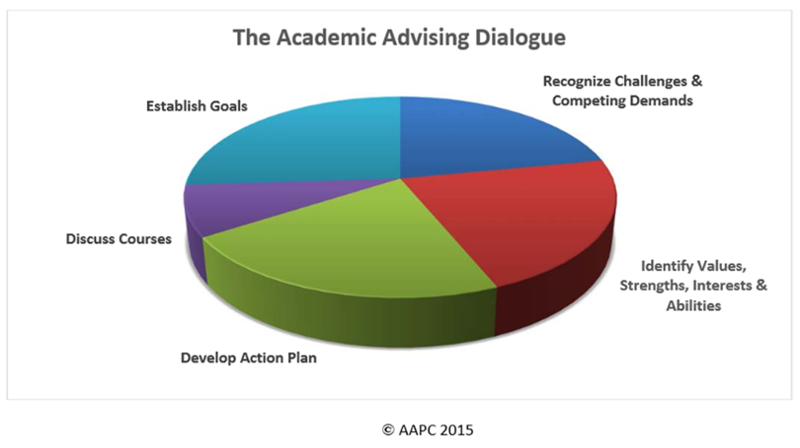About the Academic Advising and Planning Center
Our Vision Statement
Leaders in academic advising expertise, scholarship, and innovation.
Our Mission Statement
The Academic Advising and Planning Center (AAPC) prepares undergraduate students to navigate all aspects of academic planning by promoting an atmosphere that encourages self-exploration and resource utilization in support of academic success, as well as the timely and informed pursuit of an academic major.
We accomplish our mission by:
- Engaging students in individualized, technology-enhanced advising appointments wherein they explore their interests, discuss course options, consider majors and plan for the future;
- Establishing a relationship based on mutual trust with a diverse student population encouraging students to address academic strengths and challenges;
- Actively seeking and providing professional development opportunities for internal and external colleagues.
Ethics Statement
We abide by the Council for the Advancement of Standards in Higher Education's Statement of Shared Ethical Principles (PDF).
Additionally, we strive to:
- Prioritize the value of the student/advisor relationship and the student's development;
- Evaluate each student's individual situation and respond appropriately;
- Readdress ethical dilemmas as a group;
- Organize meetings with our resource referrals;
- Seek help and support from each other.
Student Learning Outcomes
It is our goal that students are able to do the following as a result of academic advising and planning:
- Create a personal path to degree completion
- Make a timely and informed pursuit of an academic major
- Use campus resources
- Find relevant policies and procedures
- Recognize the importance of balancing competing priorities
The Academic Advising Dialogue
Academic advising is not just about course selection. There are many factors that play a part in developing a thoughtful and intentional academic plan, including the student's goals, challenges, interests, and strengths. Students also benefit from discussing academic major options and coordinating career goals with educational opportunities, such as internships and study abroad. The image below represents not only the topics we discuss with students, but also how much time in each appointment is spent on each topic. Note that course selection is the smallest part. For more details on the academic advising dialogue, homework expectations, and student responsibilities for academic planning, see our Academic Advising Syllabus (PDF).

Advising at the College of Charleston
Who We Serve
- Students admitted as freshmen and not transfers are required to meet with the AAPC for two semesters, regardless of whether they’re declared or how many credits they have.
- Students admitted as transfers are required to meet with the AAPC for one semester, regardless of declaration status or credits- except those declared to a School of Business They are advised by the School of Business.
- Readmitted students are required to meet with the AAPC for one semester, regardless of declaration status or credits.
- Students who are undeclared beyond their first two semesters as new freshmen, or their first semester as transfers, must also meet with the AAPC in each semester that this is the case.
Any student, including upper-class declared students, may meet with a peer advisor during Quick Question Drop-In hours on Monday-Friday from 2-4 PM. Such students are not required to meet with the AAPC each semester, but may be required to meet with the faculty advisor assigned by their academic department.
Advising appointments with your assigned advisor may be scheduled online through Appointment Manager or by calling us at 843.953.5981. Appointments should be scheduled beginning in September for the fall term and February for the spring term so that all students can be served prior to registration.
Students who declare a major during their first year are assigned faculty advisors through their academic department as well as the Academic Advising and Planning Center. This ensures that students receive focused advising in their discipline of choice while keeping their access to an AAPC advisor to consult regarding more general college requirements and resources.
Students are reminded that they are ultimately responsible for their own academic program and course load. Academic Advising and Planning Center services never replace individual student responsibility.
The Advising Profession
Although the advising practice has been on college campuses in some form since the inception of higher education in the United States, the profession grew in strength and number with the advent of NACADA, the National Academic Advising Association. Founded in 1979, it currently has over 10,000 members worldwide. More information about the advising profession can be found at NACADA: The Global Community for Academic Advising.
Articles of particular interest:
- History of Academic Advising
- Concept of Academic Advising
- Core Values of Academic Advising
- Life in College Matters for Life After College